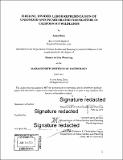Fireline, divided : labor representation of unionized and incarcerated firefighters in California's wildlands
Author(s)
Doty, Anna (Anna Dawn Havel)
DownloadFull printable version (7.412Mb)
Alternative title
Labor representation of unionized and incarcerated firefighters in California's wildlands
Other Contributors
Massachusetts Institute of Technology. Department of Urban Studies and Planning.
Advisor
Jason Jackson.
Terms of use
Metadata
Show full item recordAbstract
In California, up to 40 percent of the state's firefighters are incarcerated people working in a prison labor program called the Conservation Camp Program at small, rural prisons known as "fire camps." There are 43 fire camps throughout the state that house up to 4,500 incarcerated people and are largely co-managed by the California Department of Corrections and Rehabilitation (CDCR) and the California Department of Forestry and Fire Protection (CalFire). Each year, California's incarcerated firefighters provide approximately three million person-hours responding to fires and other emergencies and are paid between $2 a day and $2 an hour when on the fireline. Historically, the labor movement has opposed the use of prison labor, which was seen as a source of wage competition, job replacement, and strikebreaking "scabs," but since the establishment of fire camps during World War II, California's professional firefighters have acquiesced to this pervasive use of prison labor in their otherwise unionized field. As a result, California's firefighting labor force is divided between free and incarcerated, represented and not represented. Through interviews with unionized and formerly incarcerated firefighters, this thesis interrogates the labor market dynamics that contribute to the acquiescence of organized labor to this prison labor program and articulates the implications of this divided workforce on incarcerated workers who perform dangerous work for the state in a carceral context. As a workforce, California's incarcerated firefighters face heightened risks and fewer benefits than unionized firefighters, while dramatically reducing the cost of fire protection for the state. The implications of this research also extend to the possible impacts of reliance on this captive workforce on the state's fire management and criminal justice policy. Existing scholarship on prison labor endeavors to understand its role as rehabilitation or punishment in the larger system of incarceration. This research seeks to position prison labor as labor, underscoring its impact on the labor market on the "outside" and the critical need for prisoner workers' representation and workers' rights, especially in the context of dangerous work.
Description
Thesis: M.C.P., Massachusetts Institute of Technology, Department of Urban Studies and Planning, 2017. Cataloged from PDF version of thesis. Includes bibliographical references (pages 77-85).
Date issued
2017Department
Massachusetts Institute of Technology. Department of Urban Studies and PlanningPublisher
Massachusetts Institute of Technology
Keywords
Urban Studies and Planning.